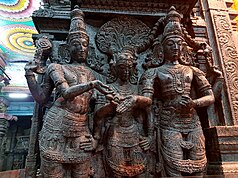Religion in India (2011 census)[1]
Religion in India is characterised by a diversity of religious beliefs and practices. Throughout India's history, religion has been an important part of the country's culture and the Indian subcontinent is the birthplace of four of the world's major religions, namely, Buddhism, Hinduism, Jainism, and Sikhism, which are collectively known as native Indian religions or Dharmic religions and represent approx. 83% of the total population of India.
The Preamble to the Constitution of India states that India is a secular state,[2][3] and the Constitution of India has declared the right to freedom of religion to be a fundamental right.[4]
According to the 2011 census, 79.8% of the population of India follows Hinduism, 14.2% Islam, 2.3% Christianity, 1.7% Sikhism, 0.7% Buddhism and 0.4% Jainism. Zoroastrianism, Sanamahism and Judaism also have an ancient history in India, and each has several thousands of Indian adherents. India has the largest population of people adhering to both Zoroastrianism (i.e. Parsis and Iranis) and the Bahá'í Faith in the world;[5] these religions are otherwise largely exclusive to their native Iran where they originated from.
- ^ "India has 79.8% Hindus, 14.2% Muslims, says 2011 census data on religion". Firstpost. 26 August 2016. Archived from the original on 26 April 2020. Retrieved 14 August 2016.
- ^ "Preamble To The Indian Constitution". legalserviceindia.com.
- ^ "S. R. Bommai v. Union of India". www.legalserviceindia.com.
- ^ Basu, Durga Das (2013). Introduction to the Constitution of India (21 ed.). LexisNexis. p. 124. ISBN 978-81-803-8918-4.
- ^ Smith 2008, p. 94.



